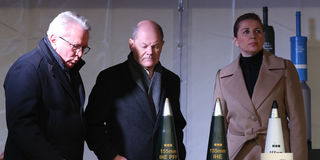Germany's Scholz urges 'mass production' of arms in Europe

(L-R) CEO of Rheinmetall AG Armin Papperger (L) talks to German Chancellor Olaf Scholz next to Danish Prime Minister Mette Frederiksen at the future site of an ordnance factory where German arms manufacturer Rheinmetall plans to start production from 2025, in Unterluess, Germany on February 12, 2024. PHOTO | AFP
What you need to know:
- Weighed down by its militaristic past, Germany has in recent decades been circumspect about its defence forces and armaments industry.
Unterlüß. Europe must ramp up production of armaments massively and urgently, German Chancellor Olaf Scholz said Monday, warning that the continent now "does not live in times of peace".
Speaking at the groundbreaking ceremony for Rheinmetall's new munitions factory, Scholz said European nations must pool together orders and financing to provide the defence industry with purchase guarantees for the next decades.
"This is urgently necessary because the painful reality is that we do not live in times of peace," he said, pointing to Russia's war on Ukraine.
"We must move from manufacturing to mass production of armaments," he said, arguing that "those who want peace must be able to successfully deter aggressors".
Weighed down by its militaristic past, Germany has in recent decades been circumspect about its defence forces and armaments industry.
But Russia's invasion of Ukraine in 2022 upended Berlin's post-World War II pacifist tendencies, and forced its transformation into a proponent of heavy rearmament.
Germany is now Ukraine's second biggest weapons contributor, and Scholz has been vocal in pushing other EU nations to give more.
What happens in Ukraine will decide "if our peace order, our rules-based world has a future," said Scholz, adding that Russia must "fail with the attempt to swallow its neighbour by force".
'Rather empty'
The chancellor also reiterated that armaments pledges from other EU nations for Ukraine were still insufficient.
The EU has set up a joint financing mechanism to meet Ukrainian demand for weapons, but the bloc has struggled to make good on promised deliveries.
Brussels pledged to provide a million artillery shells to Ukraine by March 2024, but the EU last week admitted it can only produce just over half that by the deadline.
Scholz underlined that it was key to shift gears from years of under-investment in the defence sector to building up much-needed production capacity.
"Tanks, howitzers, helicopters and air defence systems are not lined up on the shelves. If nothing is ordered for years, then nothing is produced," he warned.
Rheinmetall's new factory in Unterluess is scheduled to begin production in 2025 with an initial production run of 50,000 shells a year, before progressively reaching its full annual capacity of 200,000.
Putting the volume in perspective, Scholz said that thousands of shells are fired on a daily basis at the frontlines in Ukraine currently.
In addition, the German army's own weapons store was "rather empty" even before the war.
Rheinmetall's boss Armin Papperger said the aim of the new factory is to help secure Germany's "strategic sovereignty in the large-calibre ammunition domain".
The company is aiming to churn out up to 500,000 shells this year overall, a seven-fold jump from the 70,000 annual production before the Ukraine war.





